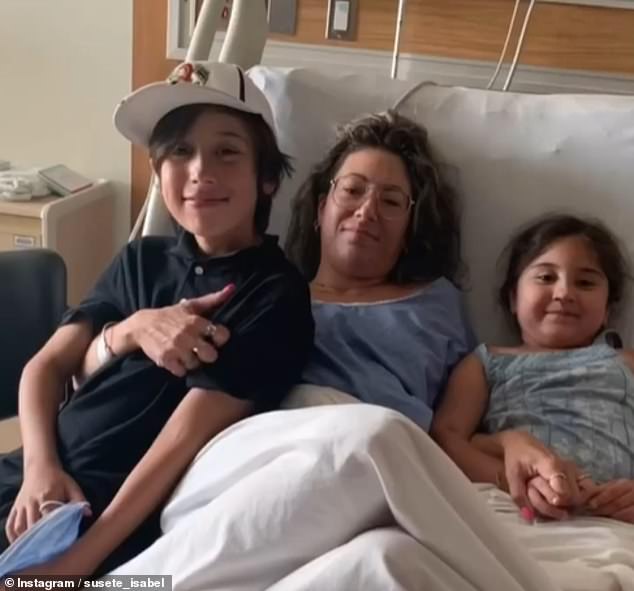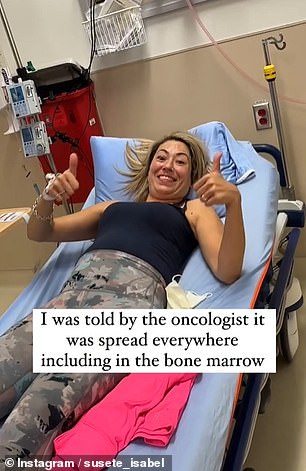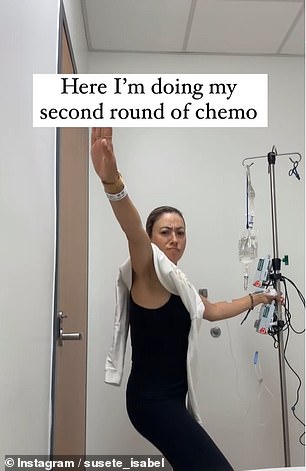I put my night sweats down to early menopause – it was actually late stage blood cancer
Susete Isabel, 40, could be forgiven for believing the symptoms she suffered at night were due to menopause.
For months she tossed and turned and suffered from hellish night sweats, leading to days plagued by debilitating fatigue.
Indeed, night sweats and fatigue are two of the most well-known symptoms of the hormonal change that can happen to a woman between the ages of 40 and 55.
Susete Isabel, 40, from Canada, was diagnosed with stage four follicular lymphoma after mistaking her symptoms for early menopause, drinking and working too much
Tragically, Susete’s assumption turned out to be a mistake.
In fact, the mother of two suffered from late-stage blood cancer.
Susete from Canada was otherwise healthy when she started experiencing symptoms in September 2023.
It wasn’t just the night sweats, she also noticed sudden weight loss and an unusually swollen abdomen.
She attributed the bloating to drinking alcohol, and her rapid weight loss to overwork.
But as she endured four days of ‘excruciating’ pain under her ribs, Ms Isabel was rushed to A&E where she was diagnosed with stage four lymphoma – a form of blood cancer that had spread throughout her body.

The mother-of-two is now urging her followers not to ignore the symptoms. “Enjoy today because tomorrow is not promised,” she wrote on Instagram
After the diagnosis, it became clear that the gnawing pain in her groin, neck and armpit were in fact signs that the cancer was damaging her lymph nodes – glands that filter substances from the body.
Now Ms Isabel is urging her followers not to ignore the symptoms, even if they seem mild.
“Don’t ignore what your body is trying to tell you,” she further wrote Instagram. “When s*** hits the fan you have no choice but to make time.”
Lymphoma is a cancer of the lymph nodes, the body’s disease-fighting network, which includes the spleen, bone marrow, lymph nodes and thymus.
It can occur anywhere in the body, but usually the first sign is swollen lymph nodes around the neck.
Other symptoms, according to the Mayo Clinic, include abdominal pain or swelling, chest pain, coughing, difficulty breathing, persistent fatigue, fever, night sweats and unexplained weight loss.
In Ms Isabel’s case, scans showed she had an enlarged spleen and lymph nodes.
The two main forms are Hodgkin’s and non-Hodgkin’s lymphoma (NHL).
NHL affects approximately 80,000 people in the US and 14,000 in the UK each year. It kills about 20,000 people in the US and almost 5,000 in Britain.
Hodgkin’s lymphoma is less common, affecting about 8,500 Americans and 2,100 Britons. It is responsible for about 900 deaths a year in the US and 310 in Britain.
Ms. Isabel was diagnosed with a form of NHL called follicular lymphoma, which grows from the B lymphocytes in the white blood cells.
These are usually responsible for making antibodies to fight disease.
According to the Lymphoma Research Foundation, follicular lymphoma “is not usually considered curable, but is categorized as a chronic disease.”
‘Patients can live for many years with this form of lymphoma.’


Ms. Isabel’s cancer spread to several organs, including her bone marrow. She went through six rounds of chemotherapy, which she said scared me to my core
“That was scary,” Ms. Isabel wrote on Instagram about her diagnosis. ‘I was told it had spread everywhere, to the groin, the armpits (upper neck), the top and bottom of the diaphragm and even into the bone marrow.’
‘God only knows how long I walked around so sick without knowing it. Unaware of all my symptoms.’
Ms Isabel has undergone six chemotherapy treatments, which she said ‘scared me to my core’. She completed her treatments on March 1 and is awaiting scans to see if there is any cancer left.
In a post from February, she said about 85 percent were gone.
Once the cancer is killed, Ms Isabel said she will receive chemotherapy injections every three months for the next two years to prevent the tumors from growing back.
Ms Isabel is now focusing on raising awareness about the symptoms on her Instagram account, which has more than 200,000 followers.
“Enjoy today because tomorrow is not promised,” she wrote.
